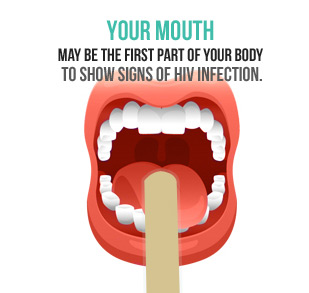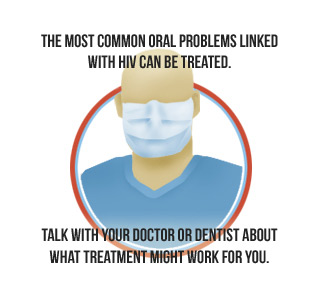Your Mouth, Your Health
When you are focused on your overall health and well-being—and especially when you are dealing with a chronic health condition like HIV—it can be easy to overlook dental issues and oral health care.
But good dental hygiene is an important part of managing your HIV disease. If you wait until you are having problems with your teeth and gums to see a dentist, you can end up with an infection, pain, and/or tooth loss.
Poor oral health can even lead to malnutrition. If you can’t chew or swallow because your mouth hurts, you may not eat enough to keep yourself healthy. This also can affect how your body absorbs your HIV medication. In addition, any infection can stimulate the virus to grow, resulting in loss of viral suppression and higher viral loads.
HIV and Oral Health
Your mouth may be the first part of your body to show signs of HIV infection. Oral opportunistic infections, such as candidiasis (thrush), are sometimes the first indicator that your immune system is not working properly—and oral health can be an important indicator of how HIV is affecting your body.
Anyone can have oral health problems, but HIV disease can make you more susceptible to:
- Oral warts, which can also progress to oral cancer
- Fever blisters
- Oral hairy leukoplakia
- Thrush
- Canker sores
- Cavities
- Gum disease (periodontitis and gingivitis)
In addition, bacterial infections that begin in the mouth, such as tooth decay, can become more serious and, if not treated, spread into your bloodstream and harm your heart and other organs. This is particularly dangerous for people living with HIV/AIDS who may have compromised immune systems.
People with HIV/AIDS may also experience dry mouth, which increases the risk of tooth decay and can make chewing, eating, swallowing, and even talking difficult. Some HIV medications can cause dry mouth.
The best ways to avoid these problems include:
- See your dentist regularly for cleanings and ask about the best way to care for your mouth and teeth.
- Brush your teeth at least twice a day. (After every meal is better!)
- Floss every day. Flossing cleans parts of your teeth that your toothbrush can’t reach.
- Take all your HIV medications on schedule—this will protect your immune system and prevent oral opportunistic infections.
- Let your doctor know if your HIV meds are causing you to have dry mouth. There are remedies.
- Examine your mouth often and tell your primary care provider if you notice any unusual changes in the way your mouth looks or feels.
- If you do not have a dentist, ask your regular clinic or provider to refer you to one.
For more information, see NIH’s Mouth Problems and HIV (also available in Spanish).
Related Topics on AIDS.gov
Frequently Asked Questions
I have never had problems with my teeth, why do I need to see a dentist?
People with HIV are more prone to some conditions which can cause serious dental problems. In addition, any infection can result in your virus starting to replicate and increasing your viral load. So to prevent complications, you should see your dental provider regularly for check-ups and cleanings.
Do I need to tell the dentist that I have HIV?
Yes, it is important that you tell your dentist that you have HIV. That’s not because your dentist will need to take additional precautions—all healthcare professionals use "universal precautions" to prevent the transmission of bloodborne disease to patients and vice versa. However, he or she will know to look for particular oral health problems that you might be at risk for.
Additional Resources
- Public Health Report Special Supplement – Innovations in Oral Health Care for People Living with HIV/AID

- HRSA - Oral Health Initiative
- HRSA – HRSA CAREAction Newsletter: Increasing Access to Dental Care
- University of California, San Francisco – HIVInSite: Oral Manifestations of HIV

- HRSA – The HIV/AIDS Program: Part F Community Based Dental Partnership Program
- HRSA – Ryan White HIV/AIDS Program Fact Sheet: Oral Health and HIV
- NIH – HIV/AIDS and Oral Health
- Office of the Surgeon General – Oral Health in America
- New York State Department of Health – Good Oral Health is Important: A Consumer Guide

Last revised: 05/07/2014



